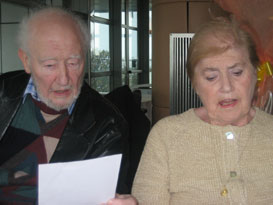11 October 2007 Edition
Fógraí bháis

Deasún and Lucy Breatnach
Deasún Breatnach
DEASÚN BREATNACH, editor of An Phoblacht between 1977 and 1979 and a devoted Irish-language activist, passed away just before midnight last Wednesday week, 3 October, the day of his beloved wife Lucy’s funeral. Lucy, born in the Basque Country and a life-long civil liberties campaigner, died in Dublin last Monday week.
Deasún was proud to be a republican and he was proud of his age. He was 85.
He was born Desmond Walsh in Belgrave Square, Rathmines, Dublin, in 1921. He was the eldest of four. He is survived by his brother Eamonn and sister Mary, Kevin having died in 2003. His father, Kevin Walsh, was described by Deasún as his “best friend”.
The law and politics were inextricably linked not only throughout his lifetime but through the lives of his father, who was a solicitor, and his grandfather, James J Walsh. James J Walsh was a celebrated solicitor who defended two of the Invincibles charged with ‘The Phoenix Park Murders’ of two of the British regime’s top three officials in Ireland in 1882.
Desmond’s father instilled in him a great love of things Irish, its history and folklore. It was this awakening in him in his later years that inspired him to change his name into the Irish version, Deasún Breatnach.
His father died when Deasún was but 12 years old. Hardship followed for the family and these formative years developed empathy for the suffering of the disadvantaged and drove his creative spirit in his future writings.
WRITER AND REPUBLICAN
During ‘The Emergency’ in the 1940s, he joined the Local Defence Forces and after the war he met his future wife, Lucy, in Madrid. Lucy was to become his wife of 60 years. The couple went on to have six children: Diarmuid, Osgur, Caoilte, Oisin, Lucilita and Cormac. Lucilita is a former general secretary of Sinn Féin.
Tragically, Lucy died just two days earlier, on the Monday morning. Lucy was the founder of the Dun Laoghaire branch of Amnesty International and an activist in the Irish Anti-Apartheid Movement and the Irish Council for Civil Liberties.
Deasún worked in Spain for the tourism board and for RKO Radio in Tangiers, North Africa. Back in Ireland, he worked in various newspapers, such as the Irish Press and the Irish Times. He later retired from the Irish Independent where he worked for many years as a sub-editor and a journalist, where he wrote under the pseudonym ‘Rex McGall’.
He was twice editor of An Phoblacht, firstly in 1973-74, as a stand-in for Éamon Mac Thomáis, who had been jailed, and then from 1977 to 1979, when he succeeded Gerry O’Hare
Deasún also wrote for publications such as The Farmers’ Journal, and An Timire, the Catholic magazine. And Deasún’s literary zeal led him to write no fewer than 12 books, including children’s tales and detective stories. In 1997, Deasún was awarded an M Litt for his Irish-language thesis on An Puca, also characterised as Puck in Shakespeare’s Midsummer Night’s Dream, the eldest in his class at the age of 76!
But despite all the prizes, degrees, books, etc, it was amongst the Irish-speaking and wider community that he was most loved and revered. Many was the night that he gave people a lift home from the Conradh na Gaeilge Club or from the Pipers’ Club, to the annoyance of his teenage children in the back seat who knew well the detours he took each Saturday night, insisting on dropping friends home.
POWER OF THE WORD
Deasún was a man who was ever-conscious of the power of the word and a gentleman who practised the old standards of courteousness and turn of phrase, especially in English.
Danny Morrison, the novelist and another former editor of An Phoblacht, said of Deasún:
“I found Deasún to always be very noble, very honourable. He was gentle but determined. And he was so knowledgeable about Irish history and the entymology of Irish words. He was fascinating.”
Rita O’Hare remembers Deasún and Lucy best not from her time as editor of An Phoblacht but when she was a prisoner in Limerick in the 1970s. Deasún wrote many letters to Rita while she was serving three years in jail although she wasn’t allowed to see them until she was released in 1979. “I’m not surprised they were stopped because they were full of passion and rage against the injustices of the Irish state, particularly against political prisoners.”
When Rita walked out of those prison gates to return to South County Dublin, Deasún and Lucy were among the very first to call to see her and offer to help her. “Deasún and Lucy were very supportive and so kind in many ways that I never will forget,” Rita said.
Sinn Féin President Gerry Adams said that Deasún and Lucy were an inspiration to all those who knew them and would be sadly missed.
One of Deasún’s most evocative poems, Adams recalled, was Deichniúr written during the 1981 Hunger Strikes.
“This has been a very sad week for the Breatnach family but I hope that they can take some succour from their parents’ lifetime of activism,” he said.
Is fíor le rá nach mbeidh a leithidí ann arís ach is fíor freisin, gur spreag sé mórmheas i measc a laochra Gaeil, agus nuair a imíonn an chorp, fanann éifeacht agus tionchar an duine ina dhiaidh agus, ar ndóigh spiorad shaothar a bheatha.
